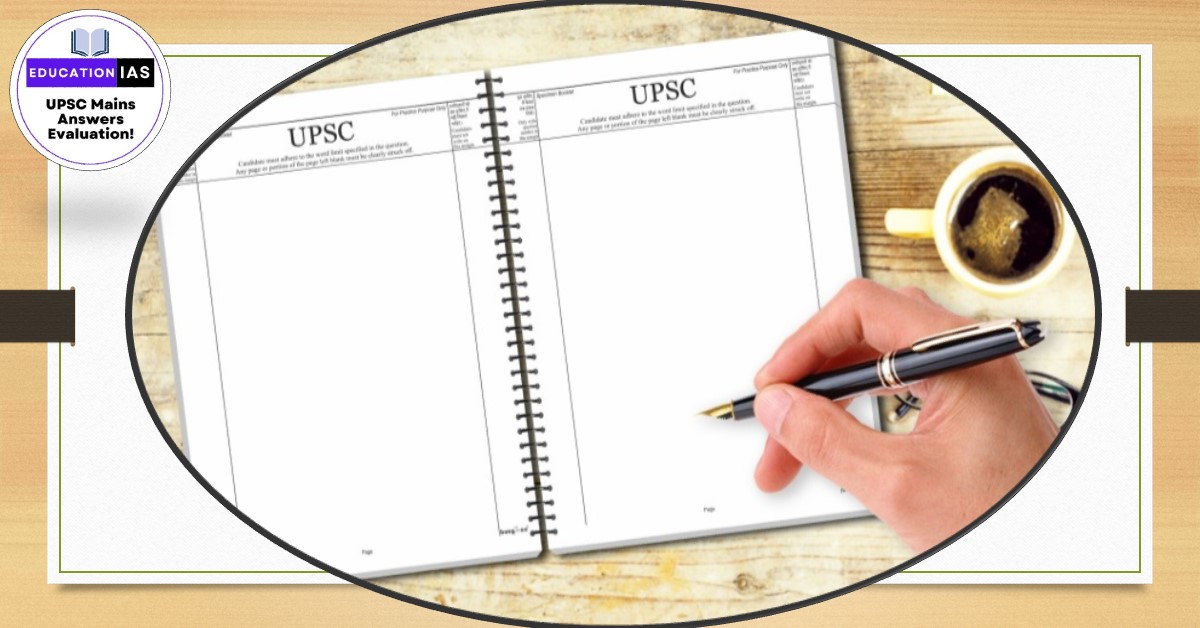Que. Examine the need for electoral reforms as suggested by various committees with particular reference to “one nation-one election” principle.
विभिन्न समितियों द्वारा सुझाए गए एवं “एक राष्ट्र एक चुनाव” के विशिष्ट संदर्भ में चुनाव सुधारों की आवश्यकता का परीक्षण कीजिए।
Structure of the Answer
(i) Introduction: Introduce the need for “electoral reforms” in India, emphasizing challenges in the current electoral system and the significance of the “One Nation-One Election” principle in enhancing governance and democratic participation.
(ii) Main Body: Discuss the factors necessitating electoral reforms, the key suggestions made by various committees, and evaluate the implications of the “One Nation-One Election” principle in detail.
(iii) Conclusion: Summarize the critical need for electoral reforms in India, highlighting how the “One Nation-One Election” principle could potentially transform governance and strengthen democracy.
Introduction
India’s electoral system faces significant challenges, necessitating comprehensive “electoral reforms.” The “One Nation-One Election” principle offers a strategic solution to enhance governance, reduce electoral fatigue, and promote efficient democratic processes across the country.
Factors Necessitating Electoral Reforms
(i) Fragmentation of Electoral Cycles: Frequent elections at various levels lead to “administrative fatigue,” diverting government attention from policy implementation to election campaigning, disrupting governance continuity.
(ii) Rising Cost of Elections: Increasing costs associated with conducting elections put a financial strain on public resources. High expenses for both the government and political parties threaten the integrity of the electoral process.
(iii) Influence of Money Power: The disproportionate influence of money in politics undermines fair competition. “Political funding” is often opaque, leading to undue advantages for wealthy candidates and parties.
(iv) Criminalization of Politics: The presence of candidates with criminal backgrounds erodes public trust in the electoral system. Stronger measures are needed to address the issue of “criminalization” in politics.
(v) Voter Apathy and Low Turnout: The frequency of elections contributes to “voter fatigue,” resulting in declining voter turnout. This apathy threatens the legitimacy of the electoral process and the representativeness of elected bodies.
Key Electoral Reforms Suggested by Various Committees
(i) Dinesh Goswami Committee (1990): Proposed reforms for transparent political funding and enhancing “voter participation” through improved election processes and awareness campaigns to ensure more informed electorates.
(ii) Indrajit Gupta Committee (1998): Recommended partial state funding of elections to reduce the dependency on private donations, aiming to create a level playing field and mitigate corruption in the electoral process.
(iii) Law Commission Report (170th, 1999): Suggested measures to address the “criminalization of politics,” including disqualification for candidates with serious criminal charges, and stricter electoral conduct regulations.
(iv) Venkatachaliah Commission (2001): Emphasized strengthening the “Election Commission’s” powers to ensure greater autonomy and control, thereby improving the effectiveness of the electoral administration.
(v) Second Administrative Reforms Commission (2008): Advocated for “simultaneous elections” at the national and state levels to streamline the electoral process, reduce costs, and enhance administrative efficiency in governance.
The “One Nation-One Election” Principle
(i) Cost Efficiency: Conducting simultaneous elections can significantly reduce the overall cost burden on both the government and political parties, leading to a more judicious use of public funds.
(ii) Enhanced Governance: By reducing the frequency of elections, governments can focus on long-term policy implementation rather than being in a perpetual state of election readiness, fostering better governance.
(iii) Improved Voter Engagement: Holding elections together can potentially increase voter turnout as it simplifies the voting process, encourages participation, and enhances public interest in the electoral process.
(iv) Political Stability: “One Nation-One Election” can promote stability by aligning electoral cycles, enabling governments to focus on policy continuity rather than the disruptions caused by staggered elections.
(v) Streamlined Administrative Procedures: Coordinating the electoral process for all levels of government can lead to a more efficient deployment of resources and personnel, enhancing the overall electoral management framework.
Challenges and Considerations
(i) Constitutional Amendments Required: Implementing “One Nation-One Election” will necessitate amendments to key articles of the Constitution, which requires a significant political consensus that can be challenging to achieve.
(ii) Complexity of India’s Federal Structure: India’s diverse political landscape, with varying regional issues, poses challenges in achieving a uniform electoral strategy that accommodates the interests of all stakeholders.
(iii) Potential Impact on Regional Parties: Simultaneous elections may disadvantage regional parties that rely heavily on state-specific issues, possibly overshadowing local concerns in favor of national narratives.
(iv) Logistical Challenges: Conducting simultaneous elections would demand extensive logistical planning and coordination among various electoral bodies to ensure the process runs smoothly across the vast country.
(iv) Need for Emergency Protocols: A framework must be established to address scenarios of political instability or emergency situations, ensuring that the “One Nation-One Election” principle does not disrupt governance.
Additional Electoral Reforms for Strengthening Democracy
(i) De-criminalization of Politics: Implementing strict laws to prevent candidates with criminal backgrounds from contesting elections will enhance the integrity of the political system.
(ii) Transparency in Political Funding: Establishing stringent regulations on “political donations” and funding sources will promote transparency and accountability, reducing the influence of money in politics.
(iii) Voter Education Initiatives: Continuous education campaigns must be conducted to inform voters about their rights and the importance of participation, fostering a more engaged and informed electorate.
(iv) Use of Technology in Elections: Advancing the use of “technology,” such as Electronic Voting Machines (EVMs) and digital voter registries, can enhance the transparency and security of the electoral process.
(v) Strengthening Election Commission Powers: Empowering the Election Commission with greater resources and autonomy will improve its effectiveness in conducting free and fair elections, enhancing public trust in the electoral system.
Conclusion
The need for comprehensive “electoral reforms” in India is urgent to strengthen democracy and governance. The “One Nation-One Election” principle, along with other suggested reforms, has the potential to transform electoral processes, ensuring transparency, stability, and enhanced public participation in the democratic framework.
